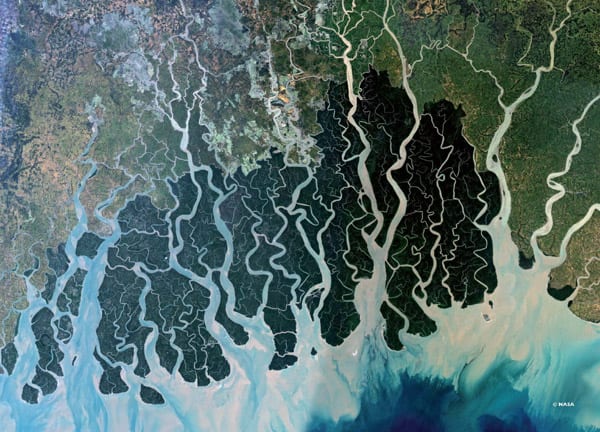
This satellite image shows the Bay of Bengal where the rivers Ganges, Brahmapoutre and Meghna meet the sea, otherwise known as the Sundarbans. Source: NASA
Have you heard of the Sundarbans? On the southern coast of Bangladesh, this precious forested area is home to 4.5 million people and the royal Bengal tiger. It’s a place of immense cultural heritage, sustaining local fisher communities and livelihoods.
But something is wrong. Industrial development – coal in particular – is threatening the air, water, and climate for the people of the Sundarbans. Locals in the area, supported by the global Bangladeshi diaspora, have known about this and campaigned for protection for years. But new aerial footage showing the extent of the damage makes it undeniable – action is needed right now to protect the Sundarbans for good. Click this video to watch:
New satellite images show the proximity of Rampal coal plant area to Sundarbans Reserve Forest and Dolphin Sanctuaries. @UNESCO World Heritage Committee must stand up to coal and list Sundarbans as a heritage site in danger. https://t.co/ESPz8spnUV #SaveSundarbans pic.twitter.com/MLwc9rYHz6
— 350 South Asia (@350SouthAsia) July 1, 2019
In June, the International Union for Conservation of Nature, the official advisor on natural World Heritage recommended that UNESCO should list Sundarbans as a World Heritage Site in Danger. IUCN recommended placing the Sundarbans, the world’s largest mangrove forest on the endangered list due to numerous threats from coal plants and increased industrial activist in the region.
These recommendations came as the construction of the Rampal coal plant continued despite the World Heritage Committee in 2016 asking the Bangladesh government to cancel the Rampal coal plant. Additionally, two more coal plants are currently being developed on the Payra river, which flows on the same bay as the Sundarbans. Over 150 industrial projects are being developed upstream.
The recommendations of IUCN are being fiercely opposed by the Bangladeshi government– despite our current climate crisis and record heatwaves in the region last month.
UNESCO delegates are currently meeting in Baku, Azerbaijan – and they’re due for a decision on whether to add the Sundarbans to the list of Endangered Sites.
Now is our time to pile on the pressure. Bangladeshi activist Tonny Nowshin and Kenyan organiser Rukiyah are Baku right now to make sure UNESCO hears our message. You can follow them on Twitter and stay updated on the day’s happening at the UNESCO meeting in Baku, Azerbaijan.
As @UNESCO delegates meet in Baku, Azerbaijan this week @350 campaigners @Rukiya_Khamis & @t_nowshin are there to convince them to add the Sundarbans and Lamu in Kenya to their list of Endangered Sites https://t.co/btaOZtVyL4 Follow them for all the latest pic.twitter.com/GNrKAqOew0
— 350 dot org (@350) July 1, 2019
Show your support for the people of Bangladesh, Kenya and communities around the world facing down new coal developments! To tell UNESCO: Stop the coal plant, save the Sundarbans
Sign the petition to Save the Sundarbans